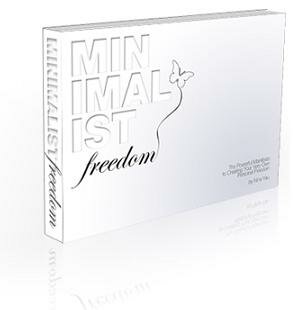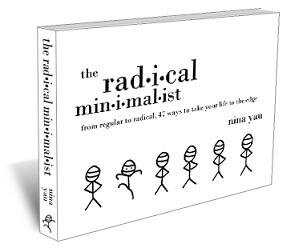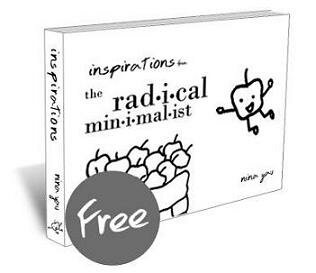Minimalism Truths: 3 Arguments and Counters on the Minimalist Life

In the end, we will all die. But have we ever really lived?
In my journey as a radical minimalist, living an unconventional lifestyle, choosing simplicity rather than consumerism, and making my own rules set for my own life, I’ve had discussions, debates, and debacles regarding what minimalism means and why it is a worthy pursuit.
Here are just some of the criticisms regarding minimalism and my counter to it.
I hope it helps broaden your viewpoints and allows you to define what minimalism means to you in your life.
After all, it is your life. What it means to you is far more important than what you read in blogs, books, news articles, and Twitter feeds about what it means. Ultimately, one needs to define it themselves.
Argument: “Minimalism isn’t sustainable. Sooner or later, you’re going to need to get more stuff.”
Counter: That is just our consumerist selves ingrained in our thinking and beliefs that we simply need more stuff.
Here’s news for you:
Society. Is. Wrong.
Look at all the advertisements out there in magazines, TV commercials, billboards, water bottles, the clothes you wear, in newspapers, on websites and blogs, on your Facebook account, on your Twitter, in your RSS reader, all yearning for your finite attention and dollars.
Do they care about your innate well-being, health, and peace of mind? Truly?
Some organizations do. Like Kiva and Charity: Water. And they are the ones making a real difference in the world. A positive, life-changing difference.
Other organizations, like mega-conglomerate retail stores and chains, electronic giants, the automobile industry, and the like, are all shoving poisoned thoughts, wants and desires down our throats.
And we’re swallowing it all up. Blindly. Without thinking. Without understanding.
I’d argue that consumerism, the way we are currently living right now, is unsustainable. Because it clearly is.
Anne Leonard documents the depravity of the way we are living in her book The Story of Stuff. What the stages of materials economy are, where T-shirts come from, our laptops, our books we love to read.
Francine Jay writes about how having less is more joyful, more peaceful, in her book .
Everett Bogue writes about how to live a minimalist life by renting a dumpster and throwing it all away in .
I recently launched a new ebook about living a radically minimalist life in The Radical Minimalist. It’s about how we must change our thinking and our lifestyle if we are to change as a person. For the better.
You see, consumerism is unsustainable, not minimalism.
Do you really think your gas-guzzling SUV that has 15 miles to 1 gallon is helping our world be a better place, with cleaner air, less pollutants, less fuel burned and wasted?
Because that’s what I see. Out of every 10 vehicles I see on the road, nearly 80% of them are SUVs and mini-vans. And I’m not talking about just in the suburbs. These are also prevalent in big cities like Chicago, where I live.
Do you really think having a 5-bedroom house with a big yard that has your own pool installed will make you happier when it’s just you and your husband? Maybe a pet cat or dog? Really?
Examine what you are doing with your life. Where all your money is going. Why you are slaving away at your job, working so damn hard just so you can pay that hefty mortgage, month after month, year after year. Just so you can live the life you thought you’ve always wanted.
In the end, we will all die. But have we ever really lived?
Argument: “What about after marriage and kids? You can’t be minimalist after that.”
Counter: I dislike the words “can’t,” “impossible,” and “never.” What do these words have in common?
It symbolizes the belief that someone is unable to do something because of some hypothetical situation (e.g., “I can’t go to Law school now; I’m way too old!) that they’ve convinced themselves that it’s true.
When someone says they can’t, lo and behold, they indeed can’t. Belief in one’s endeavors is SO important when setting out to live a radical life. To make a positive change in this world.
And when someone says they can, they indeed can. Even if they somehow “failed” or were unable to make the goal, the fact that they’ve tried is already an amazing accomplishment.
For instance, you may be participating in this month’s National Novel Writing Month. I wrote about how I’m taking the NaNoWriMo challenge here. To recap, it’s a 50,000-word novel written from start to finish in 30 days. I’m going strong, having already written 13,491 words thus far.
So if someone fails to write 50,000 words by the time midnight strikes on November 30, does that mean they are a novel-writing failure? That they’ll never be a writer, never have written the book they’ve always talked about?
Of course not. That person would have written way more in the last 30 days than they ever have in their entire lives. Not to mention a lot more than most other people in the entire world.
So when someone says after marriage and kids, one “can’t” be a minimalist, I say bull.
Look at Adam Baker. He has a wife and 1 young daughter. He sold all his crap, got out of debt, and is living freely and abundantly.
Look at Leo Babauta. He has a wife and 6 kids. He minimized everything in his life so that what remains is what’s truly important to him: spending time with family, reading, writing, and running.
Look at Joshua Becker. He has a wife and 2 kids. Living in the suburbs of Vermont, his family is the “typical” middle-class American family. But after drastically cutting down and minimizing his life, he’s discovered the beauty of a clutter-free life and mind.
Also, one needs to realize that not everyone wants marriage. Not everyone wants kids.
Remember, this is also society telling us how our lives should play out: As a child, have fun at the playground, play, jump, play hopscotch. Go to high school, attend Prom, graduate. Go to college, study abroad, graduate. Interview, land a decent-paying-and-sounding job, work. Find someone semi-compatible with you, get married. Have a kid or two or three. Add a pet in there. House. Minivan. A vacation here and there. Save for retirement. Die.
Though the above description is severely abbreviated, it is not one that overlooks the inherent truth of it all: Life. Is. Short.
Rid yourself of your clutter, your junk, your crap you’ve thought all these years you’ve always needed. You don’t.
Try something radical today. Get rid of something you thought you’ve always needed. Like a planner. Or a watch. See what happens.
Result? You don’t die from it.
I threw my planner away this summer after over a decade-long thought that I needed to jot down every single appointment, to do, event, birthday, anniversary, holiday outing, etc. I freed myself from this self-induced burden, the belief I needed to manage my time properly in order to maximize results and productivity.
I gave my watch away also this summer. I don’t keep track of time, nor do I keep track of impending events. I now live my life, freely, uninhibited, unleashed.
Foolish, time-wasting and ignorant, you say? I say living 100% of the time by your planner, by your watch, by whatever constrained means that say you need to be this productive by this time otherwise your entire day is wasted is limiting.
Interlude: Learn to Let Go
Life is but a fleeting moment, folks. I was at the library this week perusing the aisles and came across a book called The Art of Dying. Now we are writing books on how to die artfully, as if death itself wasn’t enough?
Don’t ponder, fret and fritter the best days of your life by planning how to die. Really, that is what the vast majority of the world is doing.
Look at 98% of the employees at your company. They pinch pennies, clip coupons, maximize the buy-one-get-one-free deals during the weekly mega sales at Walmart, stiff the hardworking waiter a well-deserved tip when they do go out, which is seldom, steal the company pens, notebooks, tea bags and coffee in the kitchen, rulers, post-it note pads, bags, water bottles and more, all in the effort of what? To save a few dollars? The few dollars that they end up spending anyways on their next cable bill? Because they justify that if you don’t save now, you’ll suffer horribly when you’re old and frail, living off of canned beans and tuna fish with saltine crackers. That — or wait to die at the retirement home with everyone else eating baby food.
Get rid of such constraining thoughts. If something doesn’t get done by a certain deadline that you imposed upon yourself, the world will not end. No planner? No problem. Life is but an adventure. Learn to embrace healthy risks and a certain level of ambiguity in your life.
If you know exactly when you will die, how will that change your day-to-day actions? Will you be more grateful, more appreciative of others, let go of the decades-old grudges you’ve held onto due to an overwhelmingly large ego and pride? Will you finally ski in the Andes, climb the Himalayans, snorkel in the Caribbeans, run in the Boston Marathon, speak Chinese with the locals in Wangfujing Market, practice muay thai kickboxing in Bangkok, take your son or daughter on a year-long sailing adventure around the world?
If you were to die tomorrow, what matters what’s on your planner, what’s on your To Do list? How many designer watches you own so you can just watch each second pass by in your life?
Learn to let go.
Expand this concept and experiment with other areas of your life. Until you find a happy medium, a happy balance of having only what you truly need in order to be at peace with yourself in your life.
Argument: “Minimalism works better if you’re single and young. I can’t because I’m older and more established in my ways.”
Counter: Again, this word “can’t.” Do you see how thinking you can’t actually stops you from doing something amazing? From being amazing?
Yes, I agree that a lot of minimalists we have come to read about, love, and admire are young, in their 20s and 30s. Some are single while others are not. Some have kids while others don’t.
Regardless of your current life situation, a minimalist life can be yours if you so choose it to be yours.
There’s no such thing as “it just works better if you’re single and young.”
Freedom from consumerism starts at any time, at any age, no matter where you are in life. It is about the mindset. Changing the way you’ve always viewed and thought about the world through minimalism.
What This Blog Is All About
This is what Castles in the Air is all about. Helping you to change for the better by letting go of your stuff. To become better people. To inspire you to take action for your life and to be accountable for it.
For if you don’t, who will?

 My name is Nina Yau, author of
My name is Nina Yau, author of 







